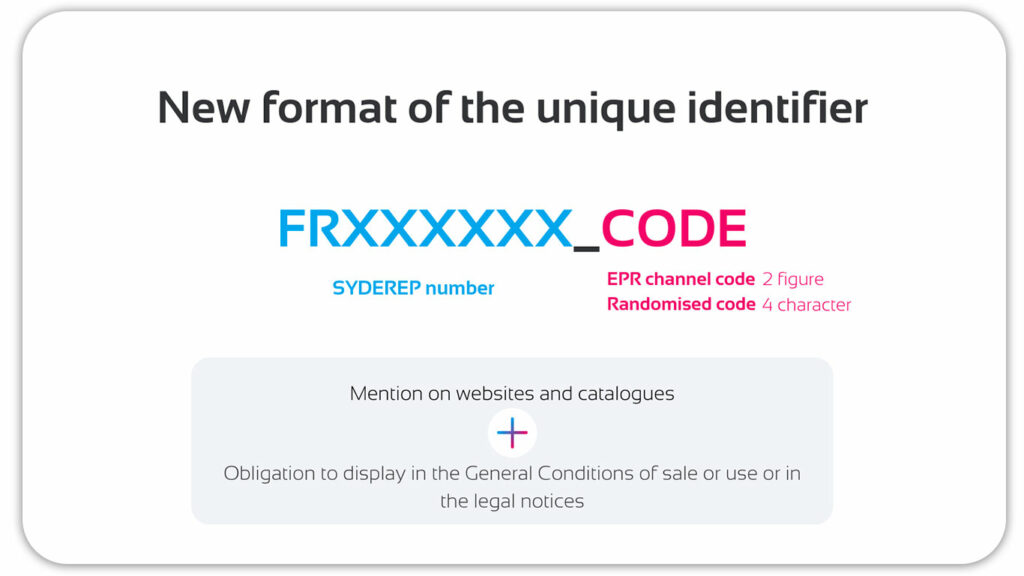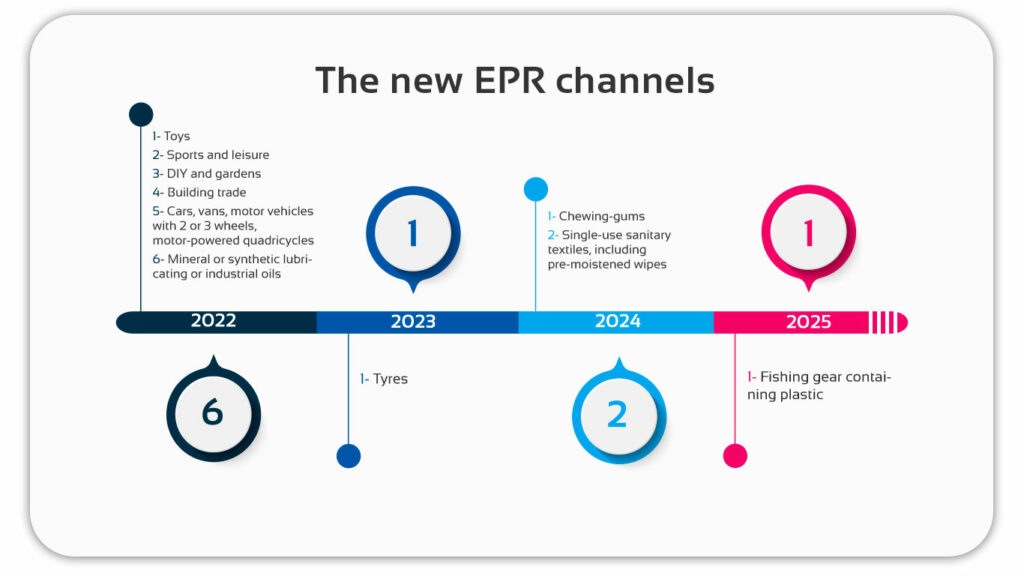You have probably heard of the AGEC Law, better known as the “anti-waste law”. Since 2020, this law has served to fight against food waste and aims to regulate waste management.
This has vaguely rung a bell for you up to now, but you will have to really get to grips with it as of 1 January, 2022, because all e-commerce sectors are now affected. Indeed, within the process of establishing a circular economy, the scope of the law extends to the digital sector, as well as to the emerging polluter-pays sectors.
So, who do these measures apply to? How does the AGEC law affect commercial stakeholders in 2022? Are you affected?
We’ll tell you all about it! You will find out all there is to know about the consequences of the AGEC law for retail websites and marketplaces. Here is our advice on the action you need to take to comply with these new measures.
SUMMARY
1. What is the AGEC law?
The anti-waste law for a circular economy (AGEC) aims, as its name suggests, to fight against waste and to set up a circular economy. More specifically, it is about changing the production and consumption model in order to reduce waste and preserve natural resources, biodiversity and the climate. The application of the provisions of this law in France meet the directives of European Union law.
-
What does the AGEC law say?
Since the publication of Law No. 2020-105 of February 10, 2020 in the Official Journal, a number of measures have been implemented, particularly in the management of waste from several sectors (for more information click here). Furthermore, the creation of polluter-pays channels aims to have treatment of waste from products financed by their producers.
This is Extended Producer Responsibility (EPR). by “producer “, the law refers to ” Any physical or legal person who develops, manufactures, handles, processes, sells or imports products that generate waste or components and materials used in their manufacture” (Art. L. 541-10 of the Environment Code).
The European Union has also chosen to use EPR mechanisms for certain product families, which is why certain French channels are also subject to European legislation
📌 NB:
The producer’s responsibility currently involves:
- The setting up of eco-bodies or individual systems approved for the management of the waste generated by their products by means of a financial contribution.
You can also designate an agent to ensure you meet legal requirements.
- The free recovery of the used products by the distributor or by a third party acting on its behalf.
“Any producer of products, whether they be based in France, in another European Union member state or in a third country, may appoint a natural or legal person based in France as an agent responsible for ensuring compliance with its obligations under the extended producer responsibility regime. This person is subrogated in all the extended responsibility obligations of the producer they agree to represent.”
Art. R. 541-174. Decree 2020-1455 of 27 November 2020
Consequently, online merchants are also considered producers and may fall under EPR legal obligations. This also affects the foreign businesses who sell in France and in Europe.
2. The AGEC law: its consequences for e-commerce websites and marketplaces
Extended producer responsibility has evolved over time, in particular with the reforms of Decree 2020-1455 of 27 November 2020 and is set to change again in January 2022. As an e-merchant, these reforms are likely to concern you, if you sell or deliver products that fall under the REP principle for a marketplace, a merchant website or any other type of digital platform.
What are the consequences of the law and what action do you need to take on your e-commerce website? How does it affect your business in the marketplaces?
a. E-merchant: how can you bring your e-commerce website into line with the law?
📌 Unique identifier
Among the major changes regarding extended producer responsibility is the move over to a unique identifier. To obtain it, producers subject to the EPR principle will have to register with the Environment and Energy Management Agency (ADEME).
As we have seen previously, the notion of producer also encompasses e-merchants, which implies that you are responsible for obtaining an identifier as a producer for those of your products that fall under the EPR principle.
The responsibility applies throughout the sale process, i.e. if it is not applied from the start, it will be by the party who is in direct contact with the buyer. In fact, this unique identifier must be made available to the producer or the seller as of 1 January 2022 according to the AGEC law. You must indicate this in the document relating to the general conditions of sale (or any other contractual document if you do not have one), in particular on your website.

NB: If you should fail to meet these obligations, you will be liable to pay a fine of up to €30,000.
But to obtain this much-touted passport, you must fulfil the extended responsibility obligations for the products that fall within the scope of this principle. Furthermore, among these obligations, you must submit annually to the ADEME a number of items for each product category in question:
- The proof of your joining an eco-organism or that you have set up your own system;
- Details of the products you have placed on the market, including the rate of incorporation of recycled material in these products;
- Details on the management of the waste originating from your products specifying, if appropriate, the materials flows;
- The relevant details for monitoring and determining the quantitative and qualitative waste prevention and management objectives.
You can send these items through your eco-organism. Next, the ADEME publishes the list of registered producers and their unique identifier.
📌 Consumer information
One of the main pillars of the AGEC Law is to better inform consumers. The measures that we will see below entail changes at several levels, in particular: the product sheet, the general conditions of sale and invoicing.
You will have to make changes to inform buyers about:
- The environmental qualities and characteristics of your products subject to the EPR principle (incorporation of recycled material, use of renewable resources, sustainability and repairability, etc.)
Where? By labelling, marking, display or appropriate process; - The bonus-malus (bonus or penalty that you receive depending on the environmental qualities of your product).
Where? Visible at time of purchase (product sheet); - Products likely to contain substances known as “endocrine disruptors”, as defined by the National Agency for Food, Environmental and Occupational Health Safety (ANSES).
Where? Accessible by electronic means in open data; - The legal conformity warranty and its duration (two years for a new purchase and 6 months for a second-hand purchase).
Where? Product invoice; - The availability or otherwise of spare parts at time of purchase for furnishings products and electronic and electrical products;
- Conservation of software compatibility for mobile phones and tablets. This information will be communicated by the manufacturer or the telephony provider.
NB in the case of omission: administrative fine of maximum €3,000 for a physical person and €15,000 for a legal person
b. E-merchant: how to ensure you are legal to sell on marketplaces.
In addition to the items we have just looked at, if, like many e-merchants, you also sell your products on marketplaces, you will also have to take into account the new requirements for them brought in by the AGEC law. Indeed, the Law considers marketplaces as “producers”. They must provide for or contribute to the prevention and management of waste from waste-generating products of their own brand and products of third-party sellers.
The marketplace is held responsible if the products of third-party sellers do not meet legal requirements.
“When a natural or legal person facilitates, through the use of an electronic interface such as a marketplace, a platform, a portal or a similar device, distance sales or the delivery of products falling under the principle of extended producer responsibility on behalf of a third party, this person is required to provide for or contribute to the prevention and management of the waste that originates from them in accordance with the provisions of articles L. 541- 10 and L. 541-10-8.”
Art. L. 541-10-9. Law n ° 2020-105 of February 10, 2020
📌 Register
However, this requirement does not apply when the marketplace manager has the documents that justify that the third-party seller has met its legal obligations. In this case, it must keep a register containing the justificatory documents and make it available to the administrative authority.
This register includes the following information:
- The ID details of the third party who puts the product on sale using the electronic interface:
a. Its company name;
b. Its trade name or its user name as communicated on the electronic interface;
c. Its identifier provided by the electronic interface;
d. Its place of business;
e. Its intra-community value added tax number or, if it does not have one, its identity numbers as defined in Article R. 123-221 of the Commercial Code or, for a non-resident company, its registration number with the tax authorities of its country of residence;
- The unique identifier delivered in application of article L. 541-10-13 to the third party who offers the product for sale when the latter is also the producer of the product, or the unique identifier delivered to the producer of the product and which has been communicated to the third party offering the product for sale in accordance with article L. 541-10-10;
- The quantities of products falling under the principle of extended producer responsibility, per category, sold by the third party through the electronic interface;
- Where applicable, the terms and conditions for taking back used products put on the market by the third party offering the product for sale in accordance with article L. 541-10-8.
📌New obligatory fields
In addition to this information that will be requested of you for your registration, marketplaces will add mandatory fields on importing your product catalogue. This step can be time-consuming depending on the number of marketplaces you manage, but also depending on the number of products you sell. To save you time and make the job easier, our feed management platform automates mandatory field updates per marketplace.
Be informed that, if you already publish on Amazon, ManoMano, Cdiscount or even Fnac marketplace, you will have already received instructions from them. For example, Amazon marketplace has informed its users about the new legal requirements for continuing to sell their products on its platform. So, the best thing you can do is to meet your legal obligations and automate the management of your marketplaces at the same time using an e-commerce flow manager, for example. 😉
Stay tuned: we are preparing an article for you which lists the impacts per marketplace, available soon!
3. To go further: a law that meets customer expectations in 2022
As we have seen above, the new measures of the AGEC Law only affect e-merchants whose products fall under the EPR. But watch out, the law will evolve to extend this responsibility by creating new channels from 1 January, 2022.
Below, the sectors that will be concerned (up to 2025):
 In addition to meeting its legal obligations and being able to continue selling on marketplaces, an e-merchant’s alignment with the AGEC Law is part of a corporate social responsibility (CSR) approach. This notably involves adapting the company’s internal policies in an ecology by design[i] rationale. This is a great sales asset in view of the new expectations of consumers, who are more sensitive to the impact their consumption has on the environment. For example, solutions for meeting new consumer expectations, both for packaging and delivery, are emerging.
In addition to meeting its legal obligations and being able to continue selling on marketplaces, an e-merchant’s alignment with the AGEC Law is part of a corporate social responsibility (CSR) approach. This notably involves adapting the company’s internal policies in an ecology by design[i] rationale. This is a great sales asset in view of the new expectations of consumers, who are more sensitive to the impact their consumption has on the environment. For example, solutions for meeting new consumer expectations, both for packaging and delivery, are emerging.
92% of e-consumers want alternatives to plastic in e-commerce packaging, but expect these alternatives to offer the same level of product protection.
At BeezUP, we work with eco-responsible marketplaces like Greenweez or Nature & Découvertes, which take these new challenges into account.
[i] Concept that takes the environmental performances of a product into account as of its design
4. In summary: what do you need to do to bring yourself into line with the AGEC law?
As you can see, since 1 January, 2022, e-merchants and marketplaces will have to meet new obligations which will be added to those existing for products subject to the principle of extended producer responsibility. The sectors affected by this principle are growing (creation of 6 new polluter-pays channels in 2022) until the 1st tier provided for by the law is reached in 2025.
Merchant sites and marketplaces will change due to the actions implemented as a result of these new provisions.
E-merchants will have to:
- Register with the ADEME to obtain a unique identifier which will be made available to the consumer;
- Create and join an eco-organism or an individual waste management system;
- Submit information to the register that must be kept by a marketplace to justify to the ADEME that a third party’s products are compliant;
- Update the product catalogue, the general conditions of sale, the invoicing documents to indicate the mandatory information in accordance with the AGEC Law;
Apart from the administrative procedures, they will be required to:
- Modify their product packaging to mention the required information;
- Review the design of their product in order to fit it into an eco-design approach (bonus-malus system, visible to consumers);
Aside from their legal obligations, e-merchants have every interest in taking the changing expectations of cyber buyers into account. In fact, since the health crisis, there has been a growing trend towards more responsible consumption. The challenge is to reconcile purchasing power and environmental protection. The AGEC law adds elements that will affect e-consumers’ choices and consequently your products, your brand image and potentially your turnover.
In conclusion, we advise you to bring yourself into line with the requirements as quickly as possible. And if you already publish or are in the process of publishing on marketplaces, opting for an e-commerce flow manager will allow you to save time on time-consuming processes thanks to automation

Annabelle Granulant
Content Manager at BeezUP





